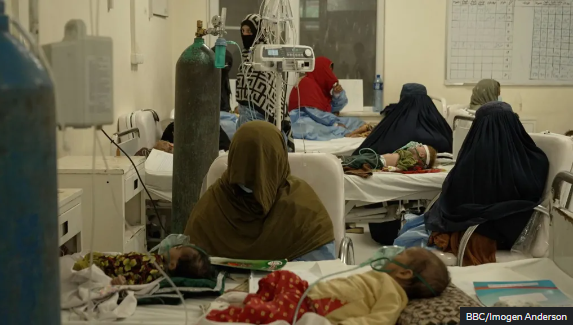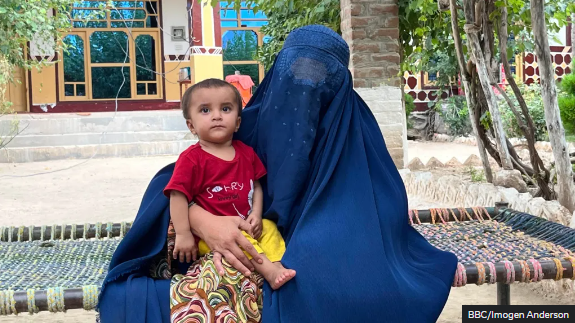Amina lost six children, none over the age of three – Dozens more struggle to survive due to severe shortages of food and medicine
“This is like a disaster for me. I feel so sad. Can you imagine what I’ve been through watching my children die?’ says Amina.
Amina lost six children. None of them made it past the age of three. Seven-month-old Bibi Hajira is the size of a newborn. Suffering from severe acute malnutrition, he occupies half a bed in a ward at Jalalabad District Hospital in Afghanistan’s eastern Nangarhar province.
“My children are dying because of poverty. All I can feed them is dry bread and water that I heat by keeping it under the sun,” says Amina.
However, Amina is not the only mother who has lost her children to malnutrition. Bibi Hajira is one of the 3.2 million severely malnourished children ravaging the country. It’s a situation that has plagued Afghanistan for decades, sparked by 40 years of war, extreme poverty and multiple factors in the three years since the Taliban took over, the BBC reports.
But the situation has now reached an impasse.
There are 18 toddlers in just seven beds. So weak to move or make a sound. Asma, who is only one year old, can hardly breathe. The doctor standing over her shakes his head. “I don’t think he’ll survive.” Asma’s tiny body has gone into septic shock.
Asma’s mother Nasiba is crying. “I feel like the flesh is melting. I can’t bear to see her suffer like this,” she cries having already lost three children. “My husband is a worker. When he gets to work, we eat.”
Dr. Ghani tells us that Asma could go into cardiac arrest at any time. In less than an hour Asma calmed down forever.
Seven hundred children have died in the past six months in hospital – more than three a day, the Taliban’s public health department in Nangarhar told the BBC. A shocking number, but there would have been many more deaths if this facility had not been kept running by funding from the World Bank and Unicef.
As of August 2021, international funds given directly to the previous government financed almost all public health care in Afghanistan.
When the Taliban took over, the money stopped because of international sanctions against them. This caused the collapse of health care. Aid organizations stepped in to provide what was to be a temporary emergency response.
“We inherited the problem of poverty and malnutrition, which has been exacerbated by natural disasters such as floods and climate change. The international community should increase humanitarian aid, not link it to political and internal issues,” said Hamdullah Fitrat, deputy spokesman for the Taliban government.
In the last three years we have been to more than a dozen health facilities in the country and have seen the situation deteriorate rapidly. In each of our recent hospital visits, we have seen children die.
“If we had more medicines, facilities and staff we could save more children. Our staff has a strong commitment. We are working tirelessly and are ready to do more,” he said.
“I have children too. When a child dies, we suffer too. I know what goes through the parents’ hearts.”
Malnutrition is not the only cause of rising mortality in Afghanistan. There are other serious diseases that children suffer from and cannot be treated due to lack of medicine.
The Jalalabad hospital serves the population of five provinces, estimated by the Taliban government at around five million people. The pressure on the hospital has increased significantly. Most of the 700,000 Afghan refugees forcibly expelled from Pakistan since late last year continue to live in Nangarhar.
In the communities around the hospital, the BBC discovered another alarming statistic released this year by the UN: that 45% of children under five in Afghanistan are stunted. Robina’s two-year-old son Mohammed is much shorter than he should be.
“The doctor told me that if he gets treatment for the next three to six months, he will be fine. But we can’t afford it. How are we going to pay for the treatment?” says Robina.
“I’m afraid he’ll be crippled and never be able to walk,” she asserted.
Mohammed can be saved from permanent damage if he is treated before it is too late.
But community food programs run by humanitarian organizations in Afghanistan have seen the most dramatic cuts – many of them have received just a quarter of the funding they need.
* Photos: BBC
Source :Skai
With a wealth of experience honed over 4+ years in journalism, I bring a seasoned voice to the world of news. Currently, I work as a freelance writer and editor, always seeking new opportunities to tell compelling stories in the field of world news.












